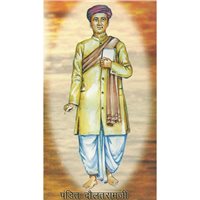
Kavivar Pandit Daulatramji
Among the early poets of the Jain community, Kavivar Pandit Daulatramji is remembered with great respect and reverence. He was born in Vikram Samvat 1805 (1748 CE) and passed away in Vikram Samvat 1923 (1866 CE). He belonged to the Paliwal gotra. His father, Shri Todarmal, was a cloth merchant in Hathras, Uttar Pradesh.
Pandit Daulatramji did not receive extensive formal education. Due to financial constraints, he joined the family business at a young age. However, he had a deep interest in Jain philosophy and pursued intense self-study and spiritual discipline. His memory was extraordinary while working on hand-painted cloth designs using wooden tools, he would keep scriptures like Gommatsar and Triloksar beside him and memorize 70–80 verses daily.
Impressed by his scholarship, Seth Maniram of Mathura invited him to Mathura in 1825. After spending some time there, he moved to Sasni. It is said that he sensed his death six days in advance and, after seeking forgiveness from his family, undertook samādhi-maraṇa (spiritual death).
His most celebrated work is Chhahdhala, a poetic composition of 95 verses across six thematic sections. Through this, he conveyed the essence of the entire Jain doctrine. It is often referred to as the “Miniature Samayasāra,” and many scholars have praised it as “an ocean in a pot.” He completed Chhahdhala on Akshaya Tritiya in the year 1844.
In addition to this, he composed over 100 devotional songs and verses. These were primarily written in Khari Hindi, with occasional use of Braj Bhasha.
Pandit Daulatramji is considered a vital link in the poetic tradition of Jain scripture and philosophy.